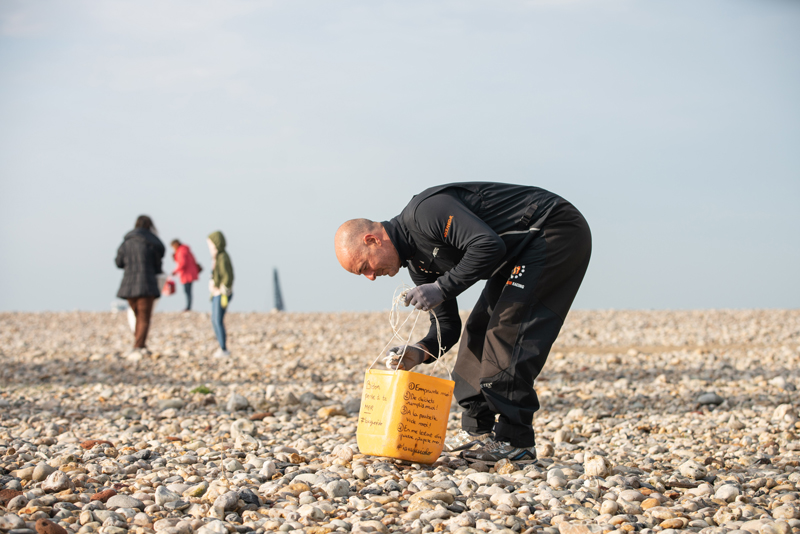Q & A with Damian Foxall, Team Sustainability Manager
The principals of 11th Hour Racing Team, including Charlie Enright, Mark Towill and Team COO Bill Erkelens, were together in Le Havre, France on Thursday prior to the start of the Transat Jacques Vabre to sign the team’s Sustainability Policy.
The policy commits the team to adhere to strict guidelines around sustainable operations while also making a pledge to be leaders, to innovate new sustainable solutions and collaborate with marine industry partners — leaving a legacy for the benefit of ocean health throughout the team’s campaign leading to The Ocean Race in 2021-2022.
We sat down with 11th Hour Racing Team’s Sustainability Manager Damian Foxall, a six-time Ocean Race participant, to find out what this means and why the Sustainability Policy signatures from Enright, Towill and Erkelens are such a vital part of the team’s overall mission during the next three years.
Q: Damian, can you tell us what the Sustainability Policy as a document stands for and why signing on this commitment by the team leaders is so important?
DF: It takes strong leadership to drive profound change, both within our team and alongside our partners and supporters. This document stands for the kind of change we believe in, and while leadership comes in many forms and from many areas of influence, this official commitment from signing demonstrates a culture of support and accountability throughout the 11th Hour Racing Team’s campaign for The Ocean Race in 2021-2022. This policy describes our vision of what a sustainable future looks like, defines what sustainability means for the team, identifies the values we hold and the commitments we make, guided by the four cardinal pillars of our “Sustainability Compass”: Leadership, Innovation, Collaboration and Legacy.
Q: How does the Sustainability Policy lay the groundwork for the full scope of the team’s Sustainability Plan?
DF: Our Sustainability Policy outlines the overall framework, while the comprehensive Sustainability Plan is being mapped out in the coming months through an organic process that involves team members and stakeholders, ensuring that we reflect their collective interests, skill sets and values. By co-creating the plan with those who understand best where real operational risks and opportunities lie, we put ourselves in the best position to achieve our goals. The Sustainability Plan is an operational document, while the Sustainability Policy is more of a theoretical commitment.
Q: What will be outlined in the team’s Sustainability Plan?
DF: Building from the Sustainability Policy, the Sustainability Plan defines four guiding pillars, twelve goals and a comprehensive set of associated targets. It aligns such elements with the United Nations Sustainable Development Goals (UNSDGs), and the World Sailing’s Sustainability Agenda 2030 objectives, and tracks all using the Global Reporting Initiative. The Sustainability Plan describes how we engage our stakeholders and how we put in place robust reporting practices; and how we manage water, waste, resources, logistics, procurement, food, climate action, education, community outreach and communications. It defines roles and responsibilities and identifies a pathway to ensure we achieve our goals; it is a detailed playbook of how we go about completing our mission.
Q: What are some of the biggest ways that the team will be committing itself to sustainable operations?
DF: We are building and training a team of individuals who are engaged on the topic of ocean health and climate issues, and who will act as ambassadors to drive change internally and as advocates for sustainable leadership amongst peers and supporters. We endeavour to integrate innovative solutions across the team’s operations by applying circular economic principles and by researching the latest sustainable materials and technologies for our boat and base build, while using a science-based approach to assess life cycle challenges.
We will engage our partners to share best practices, develop targeted initiatives and accelerate positive impacts by working collaboratively. We will look at the provenance of our materials, through the use of mapping technology to achieve traceable, transparent supply chains. We will amplify the sustainability efforts of coastal communities and cities that we visit during the campaign and work with them on a suite of legacy grant programs. All while being transparent as to our successes and challenges; sharing results and reports, so that we can set a benchmark and learn from each decision we make.
Q: What would you say to those who would comment that having a team do a race around the world is “less sustainable” than doing no race at all.
DF: Leadership requires first and foremost that you ‘turn up’ and be present. To push for change and inspire others you have to go out and do things, spread the message and collaborate. You can’t do that in a vacuum, it must start by action from within and at the grassroots. We truly believe that The Ocean Race and the sport of sailing are great platforms and a source of inspiration, especially to coastal communities, the maritime industry and sports fans locally and globally. As a team, we are driving towards zero waste, being climate positive, and transparently sharing the story of our journey — and we will minimize and avoid any potentially negative impacts on our ocean’s health from this campaign. We also firmly believe that to get everyone on-board with this growing global movement around ocean health and the climate crisis, we need to lead by example, inspiring behavior change to create lasting solutions for the ocean — one degree at a time.




